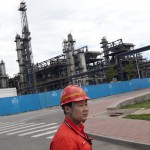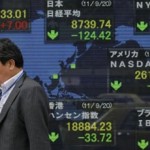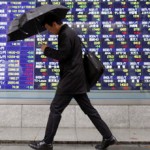Asian Stocks Retreat From Six-Year High as Kiwi Advances

Asian stocks fell, with the regional benchmark index retreating from its highest close in six years, after U.S. stocks dropped by the most in three weeks. Euronext delayed the opening of cash markets due to a “critical issue” while New Zealand’s dollar jumped.
The MSCI Asia Pacific Index decreased 0.4 percent by 2:22 a.m. in Tokyo after the highest close since June 9, 2008. Japan’s Topix index slid 0.2 percent before the Bank of Japan starts a meeting today. Standard & Poor’s 500 Index futures were little changed. The kiwi climbed at least 1.1 percent against 31 major peers after the Reserve Bank increased interest rates and signaled more tightening to come. Brent oil climbed 0.3 percent and nickel slipped 0.6 percent.
The U.S. reports on initial jobless claims and retail sales, while a report is forecast to show a pick up in European industrial production after the World Bank cut its outlook for global growth yesterday. Euronext said members are currently unable to send orders to market and the start of trading is postponed until further notice, according to an e-mailed statement. Stocks have retreated since the market value of global equities hit an all-time high of $64.96 trillion on June 10.
“We’re going to see a bit of a downside following a slide in U.S. equities,” Chris Weston, chief market strategist at IG Ltd. in Melbourne, said by phone. “A pullback in developed markets would be very positive as it will help bring fresh money in. Unless we see the fundamental picture dramatically changed, we are unlikely to see a huge correction.”
Shares Slide
The Dow Jones Industrial Average dropped 0.6 percent and the S&P 500 slipped as investors considered equity valuations. The S&P gauge trades at 16.4 times the projected earnings of its members, up from a multiple of 14.8 — its lowest valuation this year — at the beginning of February. The gauge has rallied 12 percent since then.
The MSCI Asia Pacific Index advanced 4.8 percent to 144.55 this quarter through yesterday. Samsung Electronics Co., Commonwealth Bank of Australia and SK Hynix Inc. have been the three biggest supports to the measure. The Asia-Pacific gauge trades at 13.2 times estimated earnings compared with a three-year average of 12 times.
The Topix is retreating from its highest close since Jan. 29 amid speculation the Bank of Japan will refrain from expanding stimulus at a meeting that starts today, diverging from the European Central Bank that unveiled record easing last week. Today was the fourth straight day that Japanese benchmark 10-year bonds began trading late, signaling liquidity in the world’s largest debt market is drying up.
Wheeler Comments
Hong Kong’s Hang Seng Index (HSI) fell 0.2 percent and a gauge of Chinese companies listed in the city tumbled 0.8 percent. Australia’s S&P/ASX 200 Index fell 0.4 percent and the so-called Aussie retreated 0.1 percent to 93.77 U.S. cents after the country’s reported a surprise drop in employment. South Korea’s Kospi index retreated 0.4 percent as the central bank left rates unchanged.
Reserve Bank of New Zealand Governor Graeme Wheeler said a rebuild in earthquake-hit Christchurch and elevated commodity prices are fueling economic growth. He raised the developed world’s highest benchmark borrowing cost to 3.25 percent from 3 percent and said there’s a need to contain inflation expectations. The currency jumped 1.2 percent to 86.53 U.S. cents,the highest since May 19.
“This was a much more hawkish outcome than the market had expected” from the RBNZ, said Imre Speizer, a market strategist at Westpac Banking Corp. in Auckland. Gains in New Zealand’s currency and interest-rate swaps will probably be sustained, he said.
Blankfein Concern
Investors are also considering the long-range market repercussions after U.S. House Majority Leader Eric Cantor lost to a Tea Party-backed candidate in yesterday’s primary in Virginia, fueling concern that gridlock will intensify in Washington. The seven-term House veteran was an ally for Wall Street on issues ranging from the 2008 Troubled Asset Relief Program to defending the Export-Import Bank.
“I hope it doesn’t mean that it will be impossible from this point forward to compromise on issues like the budget, immigration policy,” Goldman Sachs Group Inc. Chief Executive Officer Lloyd Blankfein said in a television interview with CNBC today. “This is not necessarily a good signal, but we’ll have to see how this plays out.”
Since Republicans took control of the House in 2011, debates over the debt limit led to 11th-hour showdowns that raised concerns that the government could default on its obligations, roiling financial markets. Congress voted in February to suspend the limit until March 15, 2015.
Treasuries climbed for the first time in four days yesterday, driving down the 10-year yield by 1 basis point to 2.63 percent. U.S. government securities had been falling since the Labor Department reported June 6 that U.S. employers added more than 200,000 jobs for a fourth month in May.
Yield ‘Magnet’
Bill Gross, manager of the world’s largest bond fund, said German bund yields at almost the least versus their U.S. peers this millennium were “a magnet” to lower Treasury yields.
Corn futures slipped 0.1 percent today. Corn fell to a four-month low as the U.S. government said global supplies will be bigger than analysts estimated. Rising grain supplies are helping to keep global food costs in check, with the United Nations saying that world prices fell in May for the second straight month.
Wheat gained 0.4 percent. Through yesterday, the grain slumped 20 percent from a 14-month closing high on May 6, the typical definition of a bear market. The U.S. is the world’s top exporter.
Source: bloomberg




























